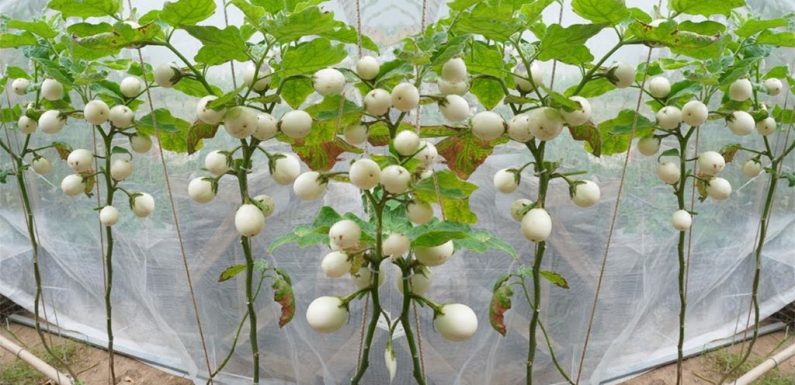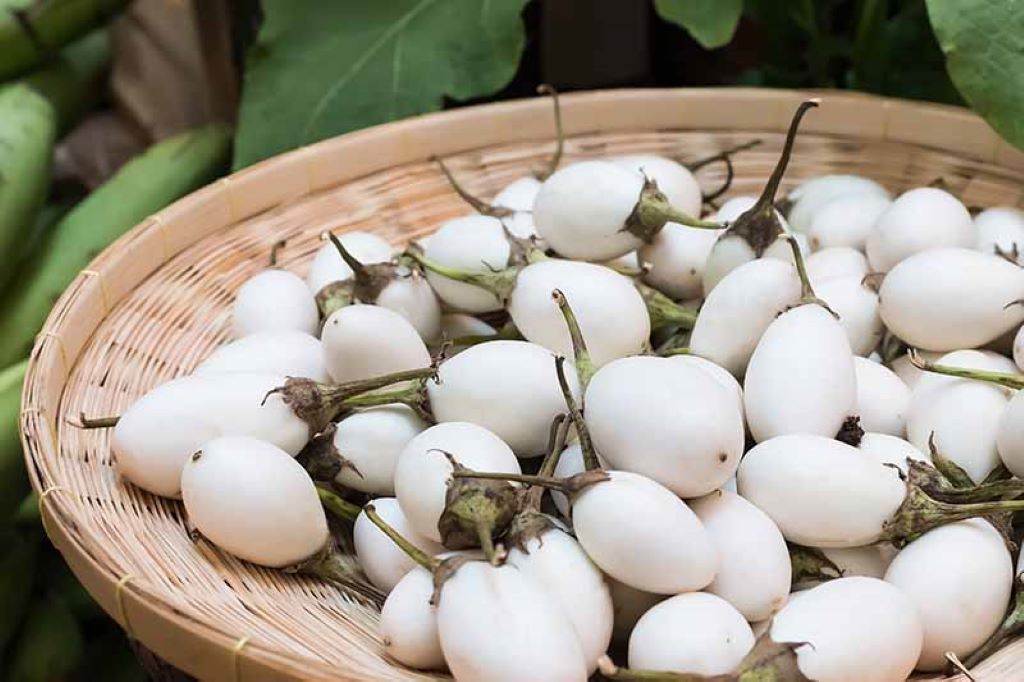
Eggplant turns white when exposed to direct sunlight or in response to high temperatures. This discoloration does not affect the flavor or quality of the eggplant.
However, it may indicate overripeness or aging of the fruit. Harvest the eggplants when they are still young and have a vibrant purple color to prevent this. Additionally, providing adequate shade and protecting the plants from extreme heat can help prevent the eggplants from turning white.
Proper watering and care can also mitigate this issue. Understanding the underlying reasons for the discoloration and taking preventative measures can ensure a successful eggplant harvest.
Reasons For White Eggplant

Eggplants, a beloved staple in both gardens and on dinner tables, occasionally present a curious phenomenon: their color shifts to white. This transformation can raise concerns among gardeners and cooks alike, as the deep purple hue is typically associated with a ripe and healthy eggplant. The reasons behind this color change to white eggplants are varied, ranging from genetic factors to environmental conditions. It’s essential to delve into the potential causes to effectively address and remedy the situation, ensuring these vegetables remain a vibrant and nutritious component of meals. For those looking to further explore this topic, Hatchettgardendesign offers insights and guidance on maintaining the health and color of your garden produce, including how to prevent or respond to the whitening of eggplants. Understanding these factors is key to enjoying the rich flavors and benefits that eggplants bring to the table.
Fungal Infections
Fungal infections can cause eggplants to turn white. One common culprit is powdery mildew, which appears as a white, powdery substance on the leaves and stems of the plant. This fungal infection can weaken the plant and result in the whitening of eggplants. Proper ventilation and removing affected leaves can help prevent the spread of fungal diseases.
Sunburn
Sunburn is another reason for eggplants to turn white. When exposed to intense sunlight, eggplants may develop white patches or discoloration on their skin. Providing adequate shade and ensuring the plants are not subjected to prolonged periods of direct sunlight can help prevent sunburn on the eggplants.
Pests And Diseases
Pests and diseases can also contribute to eggplants turning white. Insects such as whiteflies and aphids can damage the plant, leading to discoloration. Diseases like bacterial wilt can also cause white streaks or patches on the fruit. Implementing pest control measures and maintaining good plant health can help mitigate the risk of pests and diseases affecting eggplants.
Preventing White Eggplant

White eggplant can be a frustrating problem for gardeners, but there are steps you can take to prevent this issue and promote healthy, vibrant fruit. By focusing on proper plant care and implementing protective measures, you can ensure that your eggplants stay colorful and delicious. Below, we’ll explore methods for preventing white eggplant under two key categories: Proper Plant Care and Protective Measures.
Proper Plant Care
Proper care for your eggplant plants is essential for preventing the development of white eggplants. Here are some essential tips:
- Plant your eggplants in well-draining soil to prevent waterlogged conditions.
- Ensure your plants receive adequate sunlight, at least 6-8 hours daily.
- Regularly inspect your plants for signs of pests or disease and take prompt action if any issues arise.
Protective Measures
Implementing protective measures can help shield your eggplants from environmental factors that may lead to white fruit. Here’s what you can do:
- Consider using row covers to protect your plants from extreme weather conditions.
- Apply a layer of mulch around the base of your eggplant plants to regulate soil temperature and moisture levels.
- Monitor and adjust watering practices to maintain consistent, moderate moisture levels in the soil.
- Regularly inspect your eggplants for signs of stress or nutrient deficiencies, and address any issues promptly with appropriate fertilization.
Frequently Asked Questions On Why Is My Eggplant Turning White
Why Is My Eggplant Turning White?
Eggplants turning white can be due to various reasons. One possibility is sunscald, where excessive sunlight bleaches the fruit. Another reason could be a disease called powdery mildew, which creates a fine white coating on the leaves, stems, and fruit.
Lastly, it could also be a sign of overripe or old eggplants. To prevent discoloration, regularly inspect your plants, provide shade, and harvest eggplants when they are still firm and dark.
Conclusion
In a nutshell, eggplant turning white can be attributed to various factors such as sunscald, powdery mildew, or a nutrient deficiency. Gardeners must understand the underlying causes and take appropriate preventive measures to ensure healthy growth.
Among the vegetables that are easy to grow for beginners, eggplants stand out for their resilience and yield potential. Regular inspection, adequate shade, proper soil fertility maintenance, and organic fungicide use can help address common gardening challenges. By taking these steps, beginners can ensure an abundant harvest of vibrant and perfectly ripe eggplants throughout the season, making them a rewarding choice for novice gardeners.

